July 25 to July 31
The Chinese Civil War was not on Chang Hung-ming’s (張鴻明) mind when he arrived in Taiwan in the summer of 1948. The Quanzhou, Fujian native only left his hometown because the village’s Wangye (王爺) deity told him that to stay would bring disaster. Chang’s cousin had just been transferred by the Republic of China Air Force from Nanjing to Tainan, so Chang decided to visit him there.
Chang did not plan to stay long, and all he brought were some clothes and a bit of cash. He didn’t even tell his family he was leaving because he didn’t want them to worry and try to stop him.
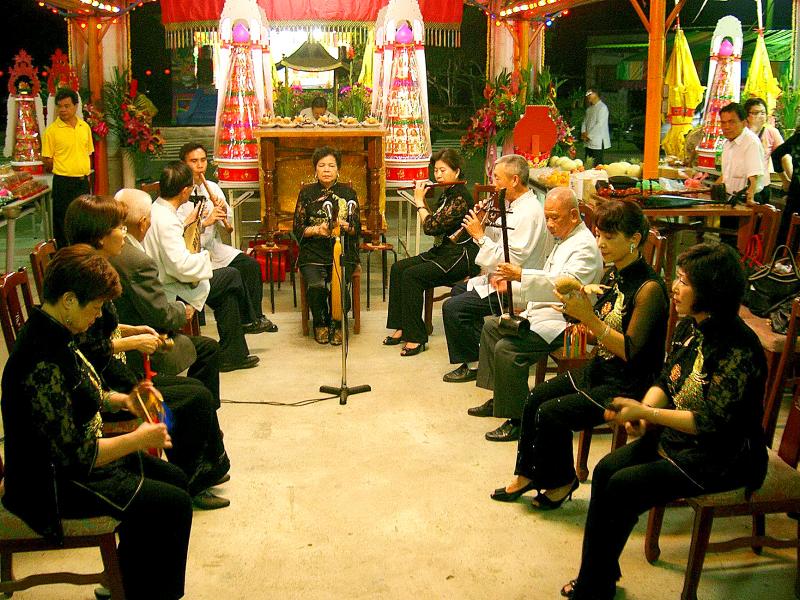
Photo courtesy of Nansheng She
As Chinese Nationalist Party (KMT) officials, soldiers and refugees were migrating to Taiwan en masse, Chang decided to pack his bags in early 1949 and return home to his wife and newborn child. After several delays due to typhoons and unrest, martial law was declared in Fujian, cutting off all travel by boat. Quanzhou fell to the People’s Liberation Army in September 1949, stranding Chang in Taiwan for the next four decades with no means to contact his family.
Chang joined the Air Force, but his true passion was performing the traditional nanguan (南管) music that has its roots in Quanzhou. Luckily for him, Quanzhou was the ancestral home for the majority of Han Taiwanese, and there was an active nanguan scene in Tainan where he settled.
He became one of the most acclaimed performers and teachers in the nation, and led the Nansheng She ensemble (南聲社) on a tour of Europe in 1982. Chang was designated a “national treasure” in 2010 and was still accepting students when he died at the age of 93 on July 26, 2013. He was given a traditional nanguan-style funeral, which had rarely been seen in Taiwan.
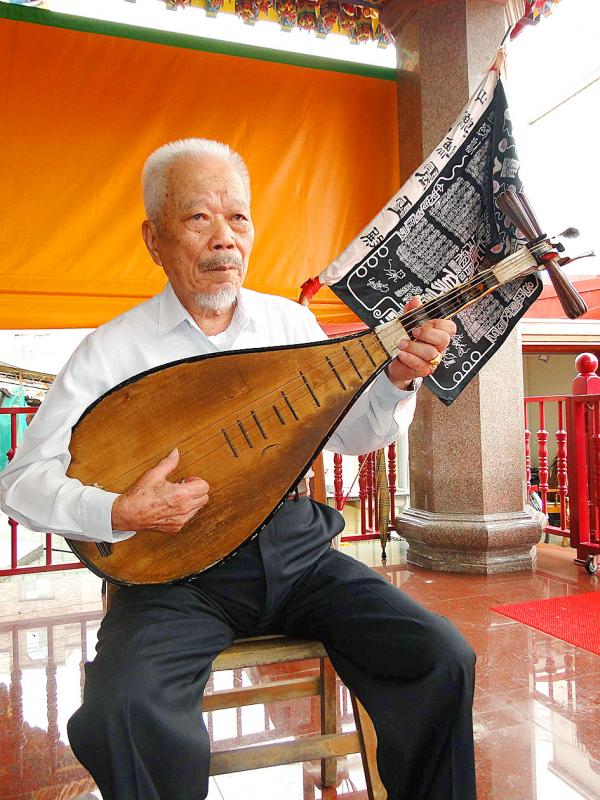
Photo: Hung Jui-chin, Taipei Times
NANGUAN VILLAGE
Chang was born Chang Shui-keng (張水坑) in 1920 to a farming and salt producing family in Dongyuan Village (東園村), Tongan County (同安), but the clan traces its ancestry to nearby Kinmen. According to his biography by Lu Chung-kuan (呂鍾寬), Chang’s commander in the Air Force changed his name to Hung-ming in 1954, because he thought that Shui-keng, which literally means “puddle,” was too crass.
Boasting 22 musicians, the village was known in southern Fujian for its nanguan performances, and Chang’s uncle, elder brother and cousin were all avid performers. It was the main form of entertainment for locals and was also heard at weddings, funerals, ceremonies and other events.
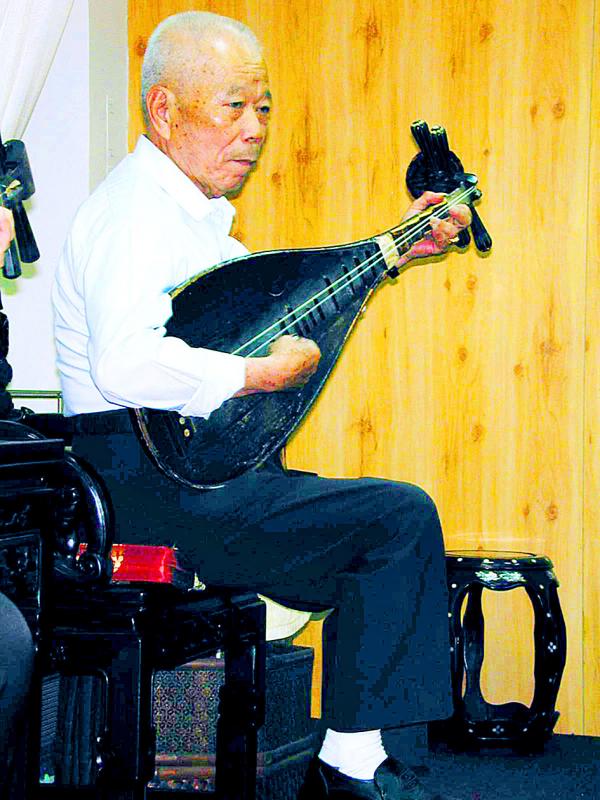
Photo: Hung Jui-chin, Taipei Times
When Chang was six years old, a clan member returned from Malaysia and the family put on a nanguan show for the occasion. Chang was mesmerized. He refused to go to bed, and after he was dragged to his room by his mother, he snuck out to keep listening.
He begged his father to teach him, and after much pestering, he was able to learn his first song: Going to Qin State (去秦邦). Chang later began training with a relative and also learned from his older brother Chang Tsai-wo (張在我). When he was 12, the clan invited renowned performer Kao Ming-wang (高銘網) to be the village teacher. Kao stayed at the family home and Chang served him as if he were his father. His skills improved rapidly.
When Chang’s father fell ill in 1948, he sought the advice of the local Wangye deity, who told him that while his father’s time had come, Chang was also in danger due to his unborn child. The only way to avoid misfortune was to leave. Chang thought of going to Southeast Asia, but he couldn’t locate any relatives, so he decided on Taiwan, eventually arriving in Tainan where his cousin lived.
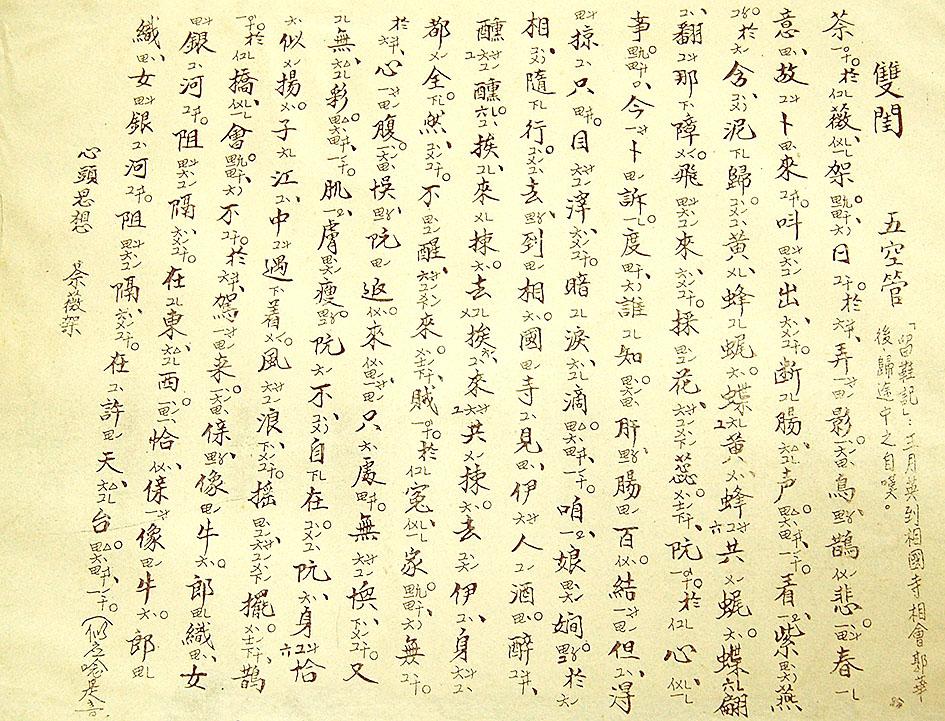
Photo: Chang Tsun-wei, Taipei Times
Chang tried to return home several times, but his cousin told him to stay put as the Chinese Civil War had reached Fujian. He tried to leave again after his family sent him a letter regarding the birth of his daughter, but the journey was canceled due to a typhoon. That was his last chance.
LOCAL LEGEND
Since Chang spoke basic Mandarin, he spent his early days in the army as a translator. Chang’s comrades at the Air Force base were mostly from northern China, and for the first few years he heard little nanguan music. He knew it existed in Tainan, however, as he heard a rickshaw driver humming a nanguan tune.
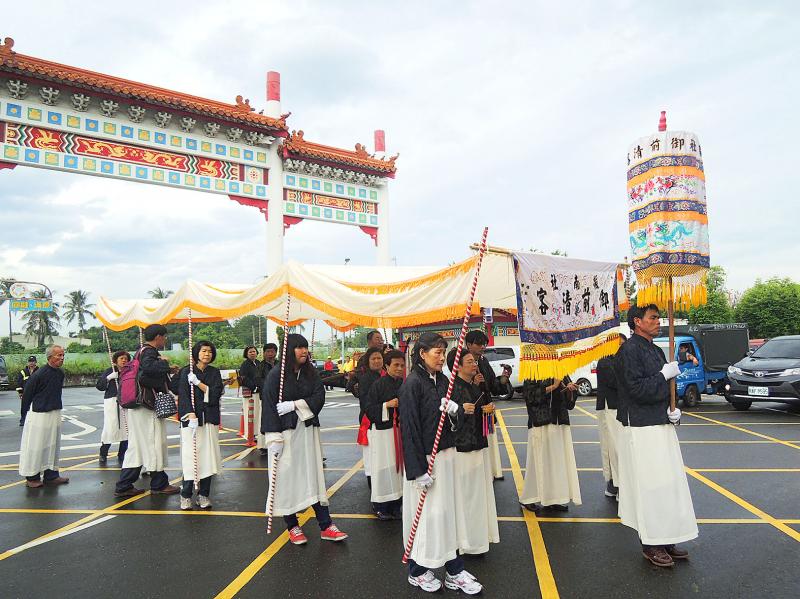
Photo: Tsai Wen-chu, Taipei Times
After settling down, he began visiting the local barber, and noticed that he had a bamboo flute hanging on his wall. One time, Chang began whistling a nanguan song; the barber whistled back and the two became friends. After closing shop, the barber brought Chang to the Nansheng She ensemble, which had been active in Tainan since 1915.
Chang had little free time to leave the base and was under curfew, which hampered his participation since the ensemble usually practiced at night. He rose to a position that was free of such restrictions in 1954, and became a mainstay in the local nanguan scene. Locals called him “Air Force Chang.”
Although Nansheng She was growing, it was missing a lead pipa player. Chang’s appearance was a godsend, Lu writes, otherwise then-leader Wu Tao-hung (吳道宏) had to juggle two roles, often keeping him on stage for four hours without bathroom breaks. Chang became the group’s master teacher in 1971, and he later also taught at Taipei National University of the Arts.
Chang’s most accomplished student was Tsai Hsiao-yueh (蔡小月), who first learned under Wu at the age of 15. Tsai had two solo records by the time she was 21, and although she stopped performing after getting married, she traveled to France in 1982 and 1991 to record six albums with Radio France.
REUNITED
After more than two decades in the army, Chang was offered a promotion to sergeant, which required him to serve at least eight more years. The 51-year-old turned it down due to his desire to search for his wife and children. As a soldier, he was forbidden from leaving the country or sending letters abroad.
Nansheng She had much interaction with its counterparts in the Philippines between the 1960s and 1980s. Since many musicians there also came from the Quanzhou area, Chang diligently went on every trip to see if he could find any information about his family. He was finally able to meet his older brother, who was part of a Xiamen nanguan delegation, during an international event in Manila in 1980.
The brothers were overjoyed to see each other, but they had to suppress their emotions: “We were afraid that the reporters would see it … and there are also spies here,” he recalls. “When we met, we didn’t know what to say because I could not be seen interacting with people from the mainland.”
In 1989, after 40 years away, Chang was finally able to go home and see his wife, child and grandchildren. He went first to the Wangye temple to inform the deity how long his trip ended up taking.
Upon seeing him, his wife Lee Ching-pao (李清苞) reportedly lamented: “I’m 65 now, I’ve spent the last 40 years crying in a field.” In 2002, Lee moved to Taiwan where she remained until Chang’s death.
Taiwan in Time, a column about Taiwan’s history that is published every Sunday, spotlights important or interesting events around the nation that either have anniversaries this week or are tied to current events.

Even by the standards of Ukraine’s International Legion, which comprises volunteers from over 55 countries, Han has an unusual backstory. Born in Taichung, he grew up in Costa Rica — then one of Taiwan’s diplomatic allies — where a relative worked for the embassy. After attending an American international high school in San Jose, Costa Rica’s capital, Han — who prefers to use only his given name for OPSEC (operations security) reasons — moved to the US in his teens. He attended Penn State University before returning to Taiwan to work in the semiconductor industry in Kaohsiung, where he

On May 2, Chinese Nationalist Party (KMT) Chairman Eric Chu (朱立倫), at a meeting in support of Taipei city councilors at party headquarters, compared President William Lai (賴清德) to Hitler. Chu claimed that unlike any other democracy worldwide in history, no other leader was rooting out opposing parties like Lai and the Democratic Progressive Party (DPP). That his statements are wildly inaccurate was not the point. It was a rallying cry, not a history lesson. This was intentional to provoke the international diplomatic community into a response, which was promptly provided. Both the German and Israeli offices issued statements on Facebook

May 18 to May 24 Pastor Yang Hsu’s (楊煦) congregation was shocked upon seeing the land he chose to build his orphanage. It was surrounded by mountains on three sides, and the only way to access it was to cross a river by foot. The soil was poor due to runoff, and large rocks strewn across the plot prevented much from growing. In addition, there was no running water or electricity. But it was all Yang could afford. He and his Indigenous Atayal wife Lin Feng-ying (林鳳英) had already been caring for 24 orphans in their home, and they were in

Australia’s ABC last week published a piece on the recall campaign. The article emphasized the divisions in Taiwanese society and blamed the recall for worsening them. It quotes a supporter of the Taiwan People’s Party (TPP) as saying “I’m 43 years old, born and raised here, and I’ve never seen the country this divided in my entire life.” Apparently, as an adult, she slept through the post-election violence in 2000 and 2004 by the Chinese Nationalist Party (KMT), the veiled coup threats by the military when Chen Shui-bian (陳水扁) became president, the 2006 Red Shirt protests against him ginned up by